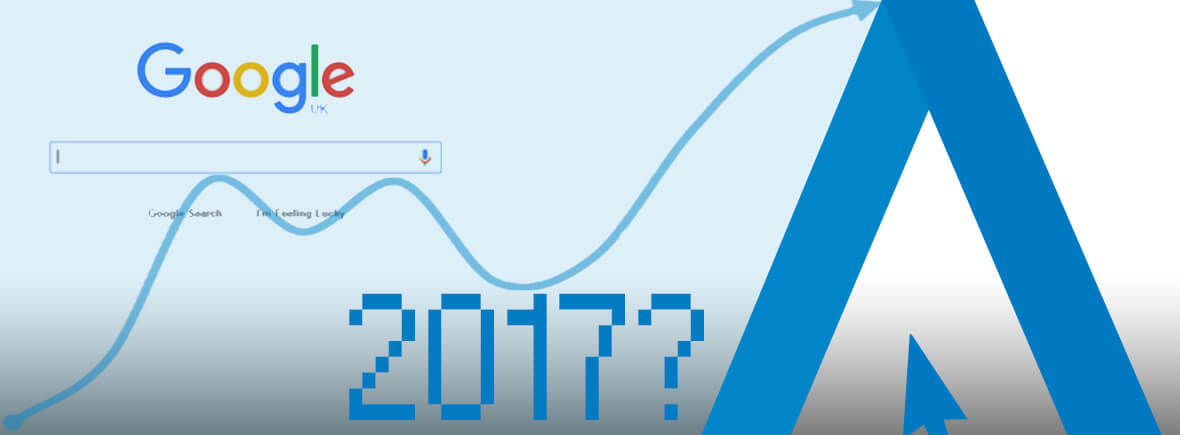
Here are our SEO look-outs for 2017.
As digital marketers we have to be up to date with the Google changes that impact our clients organic positions in the search engine results pages. Google makes over 500 changes each year, some minor tweaks, others major algorithm updates. Getting search engine optimisation right can lead to sustainable long term traffic – we know it’s not rocket science, but it is a long process of building out quality content. There are no quick fixes anymore, but working with clients to design and implement a content marketing strategy can yield amazing results. 2016 has been a very turbulent year in the index, in particular in recent months Google has made a significant update to the way it’s Penguin algorithm works, we reported this in our blog about the Google Penguin algorithm back in October.
Here are some key factors that we believe will be significant in maintaining strong search engine rankings through 2017:
Schema mark up
Schema mark-ups have long been used to help the search engines digest your content and assess suitability for search, we believe that it is going to become essential for sites to rank and that older sites (the ones you still see ranking, particularly for local, despite no content updates and very old code) will begin to suffer if they are not updated. Using a schema mark-up is becoming increasingly more important with user trends, as mobile outweighs desktop now for many websites, schemas are vital for quick digestion of content. If Google understands your website better this means that it will increase the chances in standing out from competitors, particularly with the addition of Google rich cards. Rich cards are a search result format presented in a more engaging and visual way - rich text, rich cards and quick cards offer an opportunity to stand out in search results and attract more targeted users to your page and as we all know, click through rates and further engagement are a critical factor in Google’s judgement and subsequent ranking of your site.
Collaborative cross channel marketing
It is vital for digital marketing agencies to take a holistic approach to marketing to achieve the desired results, it is certainly working for our clients as we embrace all form of marketing to drive consistent results across all channels. The Penguin algorithm judges external factors and considers spamming and over-optimisation in its judgement of a website’s trust, the latest updates have been revolutionary (in the last 4 years, which is an age in our space) in that it seems websites are not penalised for over optimisation, more this is ignored in favour of the elements of the profile that deliver trust. We believe the only way to build up trust is to have a complete balance of non-paid activity, this means social media (pages, activity, interaction), content marketing (digital PR, citation placement, commenting) offline and direct marketing (that leads to a growth in direct traffic attribution), all play an even greater combined role in delivering results across all channels. Gone are the days when you could just build links, for example for ‘SEO Leeds’ and that would deliver success, they are important but they have to then be implemented into a content sharing strategy where traffic can be attributed into the page from multiple sources, to build the trust that Google now needs to rank a website.
Google SERP (search engine ranking pages) changes
Google has been trying out some big changes to the way websites are shown in the SERP this has been done to create the best user experience. A key thing for digital marketers to keep an eye on going into 2017 would be the increased number of characters that display in the description area in the search results. This may be a great opportunity to include extra keywords and more compelling descriptions to potentially attract more visitors however Google have not announced that this is a permanent change yet. You may have noticed that Google doesn’t always show the meta description anyway, this is if they believe the page content is more relevant to the search result. Content has always been king but this further move highlights the need to ensure the on-page visible content is just as important in determining ranking as well-crafted meta data, as it could now show in the results. It seems Google’s tinkering with the search results content is picking up and we would expect more changes throughout the next year and so recommend keeping an eye on these, or watch this space for further updates.
The recent Google updates have been great for Ascensor and our clients, having an appreciation of where Google is going is vital to search engine results stability.
If you need any help, advice or support in optimising your search engine positions and generating more organic traffic, please get in touch!